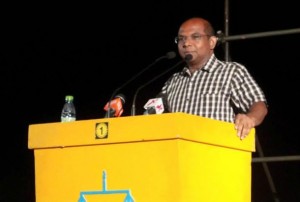The Maldivian Democratic Party (MDP) has called on the Supreme Court to “restrain itself to the legal ambit of the constitution” in an open letter from the party’s chairperson ‘Reeko’ Moosa Manik to Chief Justice Ahmed Faiz Hussain on Tuesday (September 24).
The party contended that its lawyers Hassan Latheef and Hisaan Hussain were “unlawfully suspended” by the apex court in ongoing proceedings of the Jumhooree Party’s case against the Elections Commission (EC) seeking annulment of the first round of the presidential election on September 7.
“Despite the Maldivian Democratic Party’s legal team claiming that proceedings cannot be held without their representation, the court’s decision to proceed regardless is in breach of the constitution, laws, regulation and juridical norms adhered to in the Maldives thus far,” the letter stated.
“Furthermore, it is of concern that during the proceedings there was apparent deferential treatment towards other parties to the case. Therefore, considering the manner in which the court has acted during these proceedings thus far, and since the party believes that proceedings will not continue in a way which guarantees the rights of the 95,000 people who publicly shown support for the party, this party wishes to revoke its inter-partes claim to the motion filed at the court.”
The MDP lawyers along with EC lawyer Husnu Suood were barred from proceedings by the Supreme Court yesterday for publicly criticising the court’s order indefinitely postponing the second round run-off of the presidential election scheduled for September 28.
“Journey to Justice”
In the wake of the Supreme Court’s stay order (Dhivehi) on Monday night (September 23), the party’s National Council passed a resolution approving continuous protests until a date was given for the run-off election.
MDP Spokesperson Hamed Abdul Ghafoor described the Supreme Court’s suspension of the election pending a judgment on the JP’s case as “a cynical attempt by President [Mohamed] Nasheed’s political opponents to delay an election they feared they were likely to lose.”
Nasheed emerged as the front runner in the first round of the polls with 45.45 percent (95,224 votes), followed by Progressive Party of Maldives (PPM) candidate Abdulla Yameen who received 25.35 percent (53,099 votes). The JP candidate Gasim Ibrahim narrowly missed out on the run-off with 24.07 percent (50,422) and contested the results at the Supreme Court alleging electoral fraud.
The JP and the PPM welcomed the Supreme Court injunction as a positive step towards ensuring a free and fair election. PPM candidate Abdulla Yameen told Minivan News that there was “nothing unconstitutional” with the court order.
“The Elections Commission got the opportunity to argue out their case and establish the credibility of the process,” he said.
The MDP yesterday relaunched its “Journey to Justice” demonstration at the Raalhugadu (surf point) area of the capital Male’ – 18 months after being evicted from the site by security forces – where it had set up a protest camp in February 2012 following former President Mohamed Nasheed’s resignation in what the party has maintained was a “coup d’etat” instigated by mutinous elements of the police and military working with the then-opposition.
The MDP chairperson’s letter to the Chief Justice meanwhile called upon the highest court of appeal to “uphold Article 8 of the Constitution [which] states that all powers of the State shall be exercised in accordance with the Constitution, Article 299 sub-article (a) that states that the administrators of justice shall wholly comply with the provisions of the Constitution, and Article 142 which stipulates that judges are subject to the Constitution and the law.”
 The party contends that the court’s order disregarded article 111(a) of the constitution, which states that “a run-off election must be held within twenty one days after the first election.”
The party contends that the court’s order disregarded article 111(a) of the constitution, which states that “a run-off election must be held within twenty one days after the first election.”
In his speech at the Raalhugadu protest site last night, Speaker of Parliament Abdulla Shahid asserted that the Supreme Court did not have the authority to override “any article of the constitution or even a letter of that article.”
Constitutional provisions could only be suspended by the president after declaring a state of emergency, Shahid explained, which has to first be approved by parliament.
Suspension of lawyers
In June 2012, lawyers held a crisis meeting following the publication by the Supreme Court of controversial regulations requiring all practicing lawyers to be registered at a court.
The regulations also authorised the courts to suspend lawyers for publicly criticising the judiciary or court decisions.
In February 2013, the Supreme Court suspended lawyer Abdulla Haseen after he criticised the judiciary on the MDP-aligned Raajje TV. Haseen was barred from advocating in any court in the country while the Supreme Court asked police to investigate him for contempt of court.
The Prosecutor General’s Office (PGO) however decided not to prosecute Haseen after police concluded its investigation.
Moreover, earlier this month, MDP MP Imthiyaz Fahmy was charged with contempt of court for allegedly defaming Supreme Court Justices on a Raajje TV programme.
In her report on the Maldivian judiciary, UN Special Rapporteur on the Independence of Lawyers and Judges, Gabriela Knaul, wrote that the “enforcement of compulsory registration of lawyers with the courts is also unacceptable.”
“The regulation of disciplinary measures against lawyers falls outside of the prerogative of the judiciary or any other branch of power and contradicts the principle of independence of the legal profession. During her visit, the case of a lawyer who had been indefinitely suspended by the Supreme Court for allegedly criticizing one of its judgements in public was reported to the Special Rapporteur. Such a suspension leaves no avenue for appeal and review and it represents a violation of the rights of the lawyer,” the report stated.